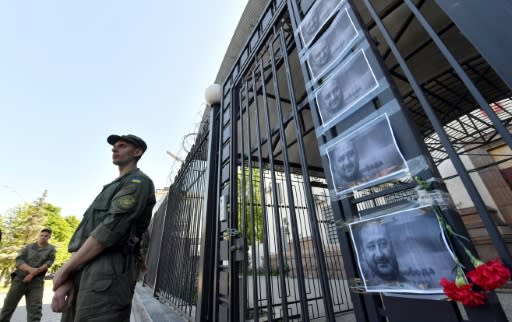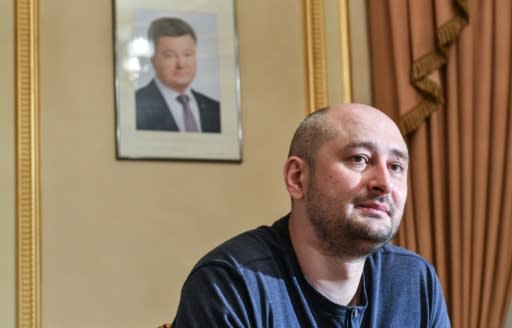Anti-Kremlin journalist defends faking own murder
Russian journalist Arkady Babchenko on Thursday defended faking his own murder with the cooperation of the Ukrainian security services, after the shock operation was criticised by fellow reporters. Kiev has come under fire after it admitted staging the killing in a bid to foil what it said was a real assassination plot by Moscow against the anti-Kremlin journalist. Babchenko made a scarcely credible reappearance at a press conference in Kiev on Wednesday, less than 24 hours after the Ukrainian authorities reported he had been shot dead at his home in a contract-style killing. "My goal was to stay alive and ensure the safety of my family. That is the first thing I am thinking about. Journalist standards are the last thing I am thinking about now," the Russian said at a second press conference on Thursday. After initial expressions of relief that Babchenko was alive, many fellow journalists have sharply criticised the staging of his death for undermining the credibility of the profession. "Friends, I couldn't care less. I don't care whether you believe it next time... as when I'm dead it won't matter to me anymore," Babchenko replied. The Kremlin earlier Thursday said the story was "at the very least bizarre" and dismissed accusations that it had attempted to assassinate Babchenko. Babchenko's staged killing fooled the world's media and led to press freedom groups raising fears about the impact it could have on the work of journalists around the globe. Some said the staged death could only lead to more accusations of "fake news", at a time when the distinction between credible and non-credible sources is becoming ever more crucial. - 'Line between truth and fiction' - "By spreading false evidence about his murder, Ukrainian authorities have seriously eroded the credibility of information," the president of the International Federation of Journalists, Philippe Leruth, said in a statement. Reporters Without Borders described the faked assassination as a "pathetic stunt". An editorial in Russian daily Vedomosti argued that the Babchenko operation "blurred the border between truth and fiction" and would lead to more distrust of the media. A number of Kremlin critics have been killed in Ukraine in recent years, with one gunned down on a Kiev street in broad daylight and another whose car exploded. Several Western commentators and reporters said it would also be difficult to trust official statements from the Ukrainian state again. Ukrainian law enforcement officials were due to hold a closed-door meeting with Western diplomats on Friday to present them with information about the operation, a Ukrainian source told AFP. Babchenko, who told the press he had been preparing to stage his death with secret services for several weeks, dismissed the criticism. "I wish all these moralisers could be in the same situation -- let them show their adherence to the principles of their high morals and die proudly holding their heads high without misleading the media," he wrote on Facebook. Other commentators urged the media to focus on the fact that Babchenko is alive. "The main thing is that the killing of a journalist was foiled, the organisers are caught and the journalist is alive," said Russian political commentator Evgeny Roizman. - 'Foiled cynical plot' - Kiev sought to justify Babchenko's "murder" that provoked an outpouring of grief and a diplomatic spat with its former masters in Moscow. "Thanks to this operation we were able to foil a cynical plot and document how the Russian security service was planning for this crime," security service head Vasyl Grytsak said when he reintroduced Babchenko, alive and well, to the world. Grytsak said the authorities had arrested the alleged mastermind of a plot against Babchenko, saying a Ukrainian citizen had offered to pay a hitman to carry out the killing after being recruited by Russian special forces and paid $40,000. A Kiev court on Thursday evening decided to hold the man in custody for 60 days, the Interfax-Ukraine news agency reported, naming him as Boris German, head of a Ukrainian-German weapons firm. It said he had claimed to be working for Ukrainian security services to unmask Russian agents. - 'Tired of burying them' - At the press conference on Thursday Babchenko said he "hated" Russian President Vladimir Putin. "This person is responsible for several wars, this person is responsible for thousands of deaths. I have buried acquaintances, I have buried colleagues, I have buried friends, I am tired of burying them," said Babchenko, who fought in Russia's two wars in Chechnya before becoming a war journalist. Babchenko left Russia in February 2017 after receiving threats. He has contributed to a number of media outlets including top opposition newspaper Novaya Gazeta and is an avid blogger, accusing Russian authorities of killing Kremlin critics and unleashing wars in Ukraine, Syria and elsewhere. Babchenko recounted details of the operation to dupe the world into thinking he was dead, including donning a t-shirt with holes made to look like they were from gunshots and smearing himself with pig's blood. burs-ant/rl/ecl Anti-Kremlin Russian reporter Arkady Babchenko defends against criticism from fellow journalists over faking his own murder Flowers and pictures of anti-Kremlin journalist Arkadi Babchenko were left at the Russian embassy in Kiev after his reported death -- which Ukraine has since admitted was faked Arkady Babchenko left Russia in 2017 living first in the Czech Republic, then Israel, before moving to Kiev




